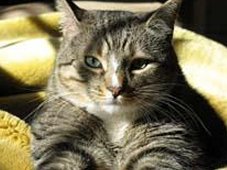Cat Food for Seniors

But Sweetie has slowed down since her middle-aged years. For advice on what foods are best for senior cats like my Sweetie, I recently consulted Dayton, Ohio-based veterinarian Amy Dicke, DVM, who has been a member of teams consisting of nutritionists, researchers and fellow veterinarians.
Cats Are Senior at 7 Years of Age
"The cat may look youthful on the outside, but aging changes are occurring on the inside," explains Dr. Dicke. If your cat is at or over the age of 7, you should transition to a "maturity" food formulated for senior cats.
Ingredients Should Satisfy Nutritional Requirements
Cat food for felines of any age should be 100 percent nutritionally complete, with no fillers or artificial preservatives. Beyond that, Dr. Dicke says these three food components gain added importance for senior kitties:
- Antioxidants: Substances that neutralize the peroxidation process are called antioxidants. Peroxidation is a normal function during which the body destroys cells that outlive their usefulness, but it can also damage healthy cells. Antioxidants like vitamin E come to the rescue by combating this damage. They also improve immune responses, which decrease as a pet ages.
- Prebiotics: Nondigestible food ingredients like soluble fibers, which can stimulate the growth or activity of good gastrointestinal bacteria, are referred to as prebiotics. They’re especially important for aging felines.
- Protein: All cats are protein-craving carnivores. Protein, the building block of muscle tissue, merits extra attention for senior kitties, though. "A diet for a healthy older pet should maintain a higher protein level to preserve muscle and [to allow the cat to] continue to be physically active," says Dr. Dicke.
Feed a Low-fat Diet
Mammals experience reduced energy expenditures and lowered metabolic rates as the years tick on. Exercise helps, so continue to play with your mature cat but be sensitive to your pet’s limitations and when rest time is needed. In terms of food, diets reduced in fat levels with lower caloric density than adult maintenance foods are beneficial to the majority of older cats. In addition, high-quality manufactured foods often include healthier fats, like fish oil, which contain omega-3 fatty acids. Studies indicate that these acids support heart, brain, joint and digestive functions.
Pay More Attention to Dental Issues
Some creatures, like sharks, can regenerate teeth if they lose them. Unfortunately, cats can’t perform this natural tooth-replacement trick. Once a tooth is lost, it’s gone for good, and kitty dentures aren’t yet available. Another problem, according to Tiffany Margolin, DVM, is that older cats can develop cavity-like "gum erosions," which can practically dissolve the teeth. If you cannot brush your cat’s teeth on your own, take it to your veterinarian for annual professional cleanings. Also, seek out dry cat foods formulated to reduce tartar buildup.
Note Behavioral Changes
When I recently celebrated a birthday, Sweetie Pie and I looked at each other as if to sing a mental chorus of Stevie Nicks’ Landslide: "I’m getting older too." Sometimes it takes a birthday or other milestone in life to wake us up to physical changes. Dr. Dicke advises that cat owners "can improve the quality of life for senior cats by recognizing their changing physical capabilities – such as a declining ability to jump up or a difficulty in climbing into the litter box – and make efforts to aid their feline companion in these everyday activities." The lowered litter box and maturity cat food in my pantry remind me that Sweetie is a bit past her prime. But I treasure every moment with her and hope she continues to go off the cat age chart.



